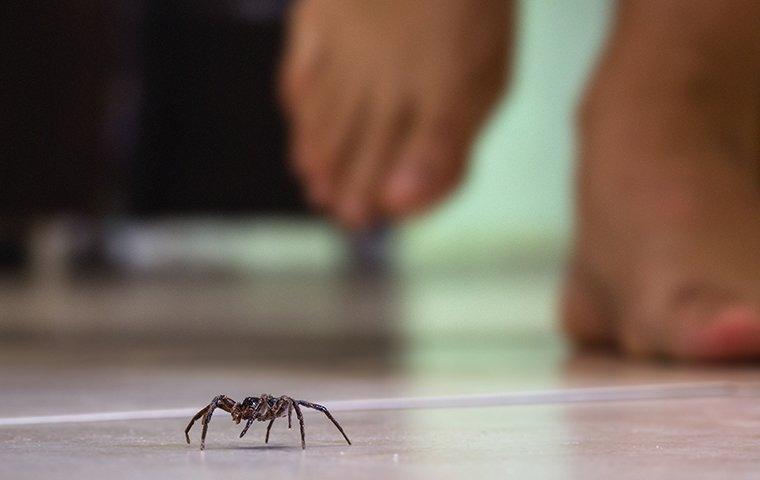Are you tired of unwanted eight-legged guests in your home? Understanding their behavior can be the first step in effective spider control in Mt. Juliet. This article delves into the various survival tactics and mating rituals of these intricate creatures. We'll also explain why professional help might be necessary in some cases and provide practical tips for keeping spiders out of your home.

Spider Behavior: How They Hunt, Feed, And Mate
Spiders are among nature's most fascinating creatures with their many intricate behaviors. From their hunting strategies to their mating rituals, the many ways spiders interact with their environment are truly amazing.
Hunting Styles
Most spiders in Mt. Juliet use their extraordinary ability to spin webs as their primary hunting tool. The complex designs are not just beautiful to behold – they also serve as deadly traps for unsuspecting insects. The well-known orb-weaver spiders create intricate, wheel-shaped webs that are sticky to trap their prey.
Some spiders, like the trapdoor spiders, are ambush predators. They dig burrows with a camouflaged lid and patiently lie in wait, pouncing on any unfortunate creature that passes by. Crab spiders often ambush their prey from flowers or leaves.
Active hunters such as the wolf spiders, on the other hand, rely on their stealth and agility. Rather than constructing webs, these spiders roam the ground, relying on lightning-fast reflexes to catch their prey. Jumping spiders use their powerful jumping ability and excellent vision to hunt insects and other spiders.
Feeding Mechanisms
Spiders cannot ingest solid food, so they liquefy their meals before eating. After trapping their prey in a web or capturing it through hunting, they inject venom into the prey to immobilize it. The venom also initiates the digestion process by breaking down the prey's body tissues, turning it into a digestible soup that the spider can then consume. Most common types of spiders have simple tubular mouthparts called the pharynx, extending down a narrow gut to their stomachs. The pharynx functions like a powerful straw, allowing the spider to suck up the predigested, liquefied prey.
Courtship And Mating
Male spiders must signal their intentions to female spiders to avoid being mistaken as prey. The male jumping spiders use visual cues, performing a complicated dance and showcasing their brightly colored body parts.
The male black widow spider uses vibrations to communicate his interest, plucking the threads of the female's web using specific rhythms to identify himself.
Chemical cues in the pheromones can also be a courtship signal. For example, male wolf spiders are attracted to chemical signals laid down by females in their silk trails. The males follow these trails to locate potential mates.
During mating, the male spider needs to defend himself from potential post-mating cannibalism by females, he employs strategies that include rapid escape, immobilizing the female, or even self-sacrifice as a diversion.
Spider Problems: Why You Don't Want These Arachnids In Your Home
Most spiders are harmless, often diligently working in the background to control insect populations. Nevertheless, it's fair to say that many of us aren’t exactly pleased when we spot one spinning its web in our living spaces. The mere presence of spiders, referred to as arachnids, in your home can pose certain problems that extend beyond our innate fear of these creepy crawlies.
Threat To Peace
For many, arachnophobia, the fear of spiders, is real and profound. Their presence can disrupt the sense of comfort and relaxation we seek in our homes. Even the smallest, most non-threatening, harmless spider can evoke anxiety and disrupt the tranquility of a living space.
Some Spiders Bite
Although the majority of spiders are harmless to humans, a few species possess venom potent enough to cause health concerns. The brown recluse and the black widow spiders, both native to various parts of the U.S., are prime examples of spiders you don't want to cross paths with. While they tend to avoid humans and only bite when threatened, their fangs can cause skin necrosis and a broad array of symptoms, such as muscle pain, fever, and difficulty breathing.
Spider Infestations
A few spiders might be acceptable, even beneficial, but a raging spider infestation is a different story altogether. Overcrowding can lead to spiders moving out from corners and into your personal spaces. The increase in the number of spiders directly correlates to the presence of other insects within your household, which could signal a bigger underlying issue. The need to control another pest population may be what's attracting spiders into your house in the first place.
Preventing Spiders In The House: Practical Tips And Tricks
Despite their ecological importance, spiders aren't always welcome indoors. Whether it's due to arachnophobia or the preference for a spider-free living space, many homeowners are eager to prevent these eight-legged creatures from taking up residence in their homes. Thankfully, there are simple and practical methods to significantly reduce the chances of spiders claiming territory under your roof.
Seal Their Entry Points
Spiders are opportunistic creatures that exploit gaps and cracks to find their way indoors. To block potential entry points, follow these steps:
- Inspect your home for cracks or gaps in the walls and around windows and doors.
- Seal any openings with caulk or bristle strips, paying special attention to gaps around pipes or wiring.
- Replace damaged window screens and seal doors with door sweeps.
Keeping these cracks and gaps sealed helps ensure a spider-proof home, greatly reducing unwelcome eight-legged visits.
Lights Out
Nighttime flying insects such as moths are attracted to artificial light, and where insects gather, spiders follow. To avoid inviting them, adjust your outdoor lighting:
- Swap out white lights with yellow or sodium vapor lights, which are less attractive to insects.
- Use motion-activated lights, minimizing the time the light stays on.
- Place lights away from windows and doors to discourage insects and spiders from finding their way indoors.
These lighting strategies can effectively reduce the number of unwanted insects and spiders around your home.
Essential Oils As Deterrents
Certain smells derived from essential oils can deter spiders from taking up residence in your home.
- Peppermint oil: Mix 10-15 drops with water in a spray bottle and spritz around windows, doors, and corners of your home
- Lavender oil: Apply drops onto cotton balls and place them strategically around the house
- Citrus oil or peels: Rub citrus peels on surfaces or use citrus-scented cleaners in your home to repel spiders
These options add a pleasant aroma with the added benefit of being a natural remedy for spiders.
Keep A Tidy Outdoor Space
Spiders prefer the outdoors, making your yard and exterior walls a potential haven for them. To discourage spiders from moving inside your home, follow these tips:
- Trim bushes, shrubs, and trees to minimize hiding spots for spiders.
- Remove standing water and debris from your yard, which can harbor insects that spiders feed on.
- Regularly sweep your porch to clear away webs and prevent spiders from moving inside.
A combination of cleanliness, proper maintenance, and utilizing natural remedies not only ensures that most North American spiders remain outdoors but also helps create a pleasant and peaceful environment for everyone within your home.
Professional Spider Control: When To Call In The Experts
Dealing with spiders in your home can be challenging on various levels. From the fear and discomfort they can cause to the frustration of braving their webs in every corner, it's no wonder many homeowners turn to DIY solutions to eliminate these intruders. Yet, there comes a point when no amount of cleaning, sealing, or essential oils seems to make a difference in keeping spiders at bay. In such cases, it's time to call in the experts. Here's what you need to know about professional spider control and when it's the right time to make that call.
When DIY Isn't Working
You've tried every trick in the book of home defense against spiders, yet every morning brings new cobwebs and sightings of spiders that seemingly refuse to leave. This persistence might be a sign that your home has a well-established population of spiders that needs professional solutions.
Increased Spider Encounters
Noticing an upswing in the number of spiders you're evicting from your home might indicate an infestation. This increase in spider sightings may reveal a thriving spider population that's best dealt with by professional exterminators.
Encountering Venomous Spiders
If you have reason to believe that dangerous venomous spiders like the brown recluse or black widow have made your home their breeding ground, it's time to act. The risk of encountering these venomous neighbors in your home could be dangerous, especially for children and pets.
The All-American Pest Control Difference
At All-American Pest Control, we understand your need for a spider-free home. Our certified and knowledgeable spider control technicians provide reliable, efficient, and lasting solutions. Utilizing state-of-the-art equipment, natural pest control methods, and in-depth inspections, the All-American Pest Control team will not only solve your spider problem but also help you identify and address underlying issues that may be attracting these critters to your home.
Don't wrestle with spiders on your property any longer. Contact All-American Pest Control today for spider control in Mt. Juliet. We'll go above and beyond to ensure your world is pest-free – that's the All-American Pest Control difference.
We're Ready To Help
Call Our Office or Complete the Form To Get Your Customized Quote
 1449 Reviews
1449 Reviews




